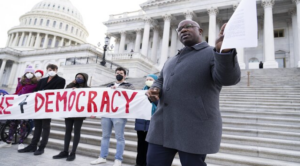After years of grappling with systemic racism in America, Democrats have introduced a solution they believe will uplift racial minorities nationwide: a resolution declaring racism a public health crisis. Led by Sens. Sherrod Brown (D-OH), Cory Booker (D-NJ), Alex Padilla (D-CA), and Mazie Hirono (D-HI), this resolution aims to acknowledge and address the systemic barriers and inequities faced by racial minorities in the country.
However, as with similar proposals, the question arises: Is this a genuine step toward equality or a mere symbolic gesture to portray Democrats as advocates for disadvantaged communities of color?
Brown underscored the significance of the resolution, stating it is “an important step toward recognizing the racial disparities in healthcare that have existed for far too long while also outlining concrete action we can take now to help reverse them.” Booker echoed this sentiment, emphasizing that designating racism as a public health crisis is “a small yet critical step toward acknowledging the systemic inequities in our nation.”

The resolution acknowledges the long-standing history of racism and discrimination within healthcare and highlights the systemic barriers faced by people of color when accessing care. It also addresses the detrimental effects of systemic racism on the health and well-being of communities of color, resulting in shorter life expectancy, poorer health outcomes, and increased exposure to harmful environments. The resolution calls for tangible action to address health disparities and inequities across all sectors of society.
However, critics argue that this resolution amounts to little more than a symbolic gesture, typical of left-leaning politicians. They contend that existing anti-discrimination laws should suffice in addressing racism in healthcare and that government declarations alone won’t bring about meaningful change.
This move comes at a time when black and brown voters are growing increasingly disenchanted with the Democratic Party. Some speculate that the introduction of this resolution may be an attempt to garner support from minority communities, particularly amidst concerns about declining support for President Joe Biden among black voters.
 While the resolution may face opposition in the House if passed in the Senate, critics suggest that its rejection could be used by the left to accuse Republicans of racism. Nonetheless, they argue that the resolution itself is unlikely to result in substantial progress toward addressing systemic racism in healthcare and other sectors.
While the resolution may face opposition in the House if passed in the Senate, critics suggest that its rejection could be used by the left to accuse Republicans of racism. Nonetheless, they argue that the resolution itself is unlikely to result in substantial progress toward addressing systemic racism in healthcare and other sectors.




